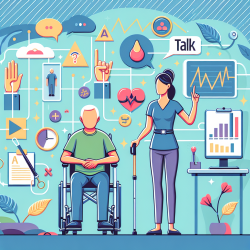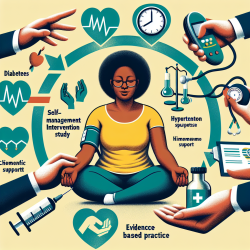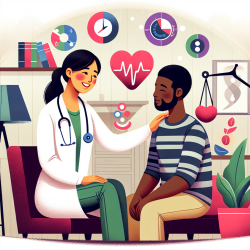Introduction
As practitioners in the field of speech-language pathology, our ultimate goal is to enhance the quality of life for our clients through effective and personalized interventions. Recent research, such as the study titled "Perceptions of Communication and Mobility Recovery Among Stroke Survivors With and Without Aphasia," provides invaluable insights into the recovery experiences of stroke survivors. This blog will explore how practitioners can leverage these findings to improve their therapeutic approaches and encourage further research in this area.
Understanding the Research
The study conducted semi-structured interviews with 17 stroke survivors, both with and without aphasia, three months post-discharge from inpatient rehabilitation. The qualitative data revealed key themes in communication and mobility recovery, highlighting perceived facilitators and barriers. Notably, the study emphasized the need for individualized care, considering both impairment-specific and broader quality of life factors.
Key Findings and Implications for Practice
- Individualized Care: The study underscores the importance of tailoring rehabilitation programs to each individual's unique needs and circumstances. Practitioners should consider factors beyond the stroke itself, such as personal motivation and family dynamics, when designing interventions.
- Family Involvement: Family support emerged as a significant facilitator of recovery. Early implementation of communication partner training for families can enhance the recovery experience, particularly for those with communication impairments.
- Intensity of Rehabilitation: Participants expressed a need for high-intensity rehabilitation. Practitioners should strive to challenge clients while balancing patience and understanding, adapting their approach to each client's preferences and capabilities.
Encouraging Further Research
This study opens the door for further exploration into the nuanced experiences of stroke survivors. Future research could focus on the early implementation of communication partner training and its impact on recovery outcomes. Additionally, examining the interplay between different types of communication deficits and recovery experiences could provide deeper insights into effective therapeutic strategies.
Conclusion
By integrating the insights from this research into practice, speech-language pathologists can enhance the recovery journey for stroke survivors. Emphasizing individualized care, family involvement, and high-intensity rehabilitation can lead to improved outcomes and a better quality of life for clients. As we continue to learn from research, let us remain committed to data-driven decisions that prioritize the well-being of those we serve.
To read the original research paper, please follow this link: Perceptions of Communication and Mobility Recovery Among Stroke Survivors With and Without Aphasia.










